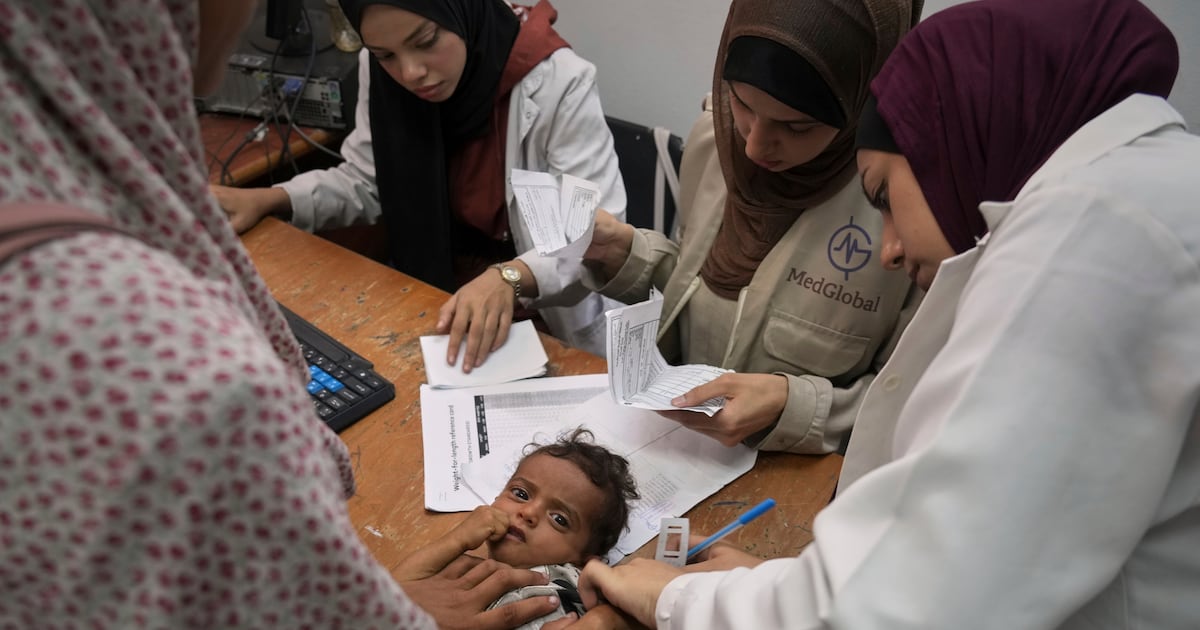A surge of unidentified viral infections is sweeping across Gaza, overwhelming hospitals and pushing the territory’s fragile healthcare system to the edge of collapse.
In recent weeks, Gaza’s Ministry of Health has been monitoring what it describes as a dangerous outbreak of respiratory viruses particularly affecting children and women.
The illnesses involve a troubling combination of symptoms- persistent fever, joint pain, runny nose, cough and diarrhoea lasting more than a week – says Dr Mohammad Abu Salmiya, director of Al Shifa Hospital.
“We cannot identify a single virus responsible,” Dr Abu Salmiya told The National. “There are several viruses behind this outbreak, and they are extremely dangerous. Malnutrition, lack of clean water, poor hygiene and the severe overcrowding in tents are accelerating the spread.”
The healthcare system, battered by nearly two years of war and a punishing blockade, cannot cope. There is no capacity for testing, so doctors must make diagnoses based on symptoms alone.
“We cannot conduct tests, and the system is under unbearable pressure,” Dr Abu Salmiya added. “We urgently need to stop the genocide, because only that will end this health catastrophe.”
Medical supplies are critically low due to the continued closure of Gaza’s border crossings. In response, medical teams are urging residents to rely on basic precautions: drinking only clean or boiled water and administering saline solution to children, mothers and the elderly to prevent dehydration.
For Yasmeen Murad, from Nuseirat camp, the crisis is very personal. Two weeks ago, her son Gaith, eight, fell gravely ill. Days later, her daughter Sara, five, developed the same symptoms.
“Their symptoms are like the flu but worse,” Mrs Murad told The National. “Runny nose, joint pain, headaches, stomach aches. I tried painkillers, but nothing worked. The clinics told me it’s one of the viruses spreading here, but they can’t test or treat it.
“I can only give them painkillers and saline. Many children around us are suffering the same way.”
Mrs Murad, 32, said her family – like thousands of others – have been without access to real medical care since the conflict started in 2023. “There is no treatment and no diagnosis,” she said. “We are living in catastrophic conditions.”
A week ago, Maryam Sleem, 31, was displaced with her family to a tent in Deir Al Balah from an apartment in Gaza city.
On their very first night there, her six-year old son Muath started suffering from severe flu-like symptoms, including chills, a headache and joint pain. A nearby medical clinic could only offer him paracetamol. Days later, his condition worsened, and when she took him back, they said they had no treatments available except for the painkillers.
“I found that many of the children in the camp are suffering from the same thing as my son,” Mrs Sleem told The National.
“Everyone is talking about a dangerous virus spreading among children in Gaza, causing flu-like symptoms that last for several days, leaving them unable to eat and stuck in bed.”
“The hardest thing for me is seeing him withering before my eyes, and not being able to do anything for him or save him from the difficult health condition he is going through,” she added.
Health authorities echo that alarm. Dr Munir Al Bursh, director general of the Ministry of Health in Gaza, said doctors are confronting viruses that appear to combine symptoms of influenza and Covid-19, but with no laboratory capabilities, the precise cause remains unknown.
“We have lost the ability to diagnose diseases because our laboratories are non-functional and we lack basic supplies,” Dr Al Bursh told The National.
“We cannot provide treatment due to the overwhelming number of patients and the severe shortage of medicine. We urgently need international intervention to stop this tragedy and contain the dangerous spread of disease.”
Dr Al Bursh said the outbreak began to intensify in July, although the true scale remains unclear. Hospitals report dozens of new cases daily with similar symptoms, most of them children.
“The virus is dangerous because it strikes the most vulnerable, and we are unable to provide care,” he said.
Officials attribute the rapid spread to deteriorating living conditions: soaring rates of malnutrition, infestations of insects and rodents, piles of uncollected rubbish, non-functional sewage treatment facilities, and the swelling number of displaced families living in tents amid the summer heat.
As untreated illnesses continue to spread, Gaza’s health leaders warn that unless immediate humanitarian intervention is secured, the outbreak could escalate into a full-blown public health disaster in a region already ravaged by war, blockade and the collapse of essential infrastructure.

